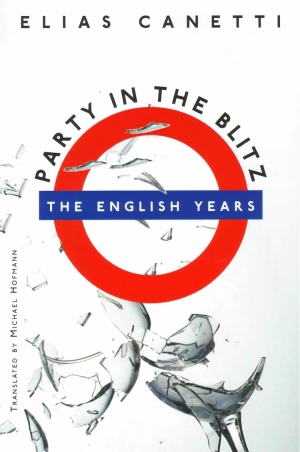Review: Party in the Blitz December 30, 2013
Author: Beach Combing | in : Contemporary , trackbackElias Canetti was a Bulgarian-Swiss-British writer, who wrote autobiography, a particularly twisted form of central European sociology and who penned one important modernist novel, translated into English as Auto-da-fé. He won a Nobel Prize in 1981, which is, of course, no guarantee of quality: Dario Fo and the EU did, Borges and Calvino didn’t. But in this case should perhaps be counted in Canetti’s favour: posterity recognizing that he was ‘a piece of work’. His last published, post mortem book was the extraordinary Party in the Blitz: the English Years. Canetti had sensibly fled to England after Anschluss and resided in the island for the duration before eventually moving on, sensibly again, to Switzerland.
The book is really a series of sketches of individuals that Canetti met between 1938 and the end of the war: in fact, some references tip over into the Attlee government including a memorable description of Enoch Powell, one of the most able post war MPs, publicly beating his chest at a party. The subject works as (i) this was an extraordinarily interesting period of British history; (ii) Canetti had that happy knack of meeting people of importance and drawing them into his web; (iii) Canetti wasn’t a particularly nice man and hated almost everyone he met.
That last point needs some attention as it may not sound like a reason to read a book. The truth is that Canetti is occasionally complimentary about passing acquaintances. But in most cases the more Canetti knew someone, the more he grew to dislike them. He describes, for example, his ‘false friendship’ of several decades with poor old Kathleen Raines, who clearly doted on Canetti. There is also some EXTRAORDINARY descriptions of making love to Iris Murdoch, English novelist and philosopher, who Canetti grew, first, to loathe and then to hate with soul-destroying passion. Perhaps on analysis we are all rather unlikeable people and perhaps Canetti’s curse as a novelist was that he saw this too well?
The ‘person’ he got to know best was England. It is almost moving to watch Canetti’s confrontation with one of the most bizarre and difficult to penetrate nations on the planet. On the one hand, we have the descendant of Sephardic Jews, who spoke Spanish Ladino as his mother tongue, who had grown up on the Danube, who had gravitated to Vienna and who had come to England for refuge. He is the quintessence of the Continental experience: a character with a biography like this wouldn’t seem credible in a novel. On the other hand, we have a country whose vices are all too evident to outsiders and whose virtues are hidden or, better, remain difficult to pin down. I don’t know any better twentieth-century description of Britain by an outsider.
Other unusual books? drbeachcombing AT yahoo DOT com



